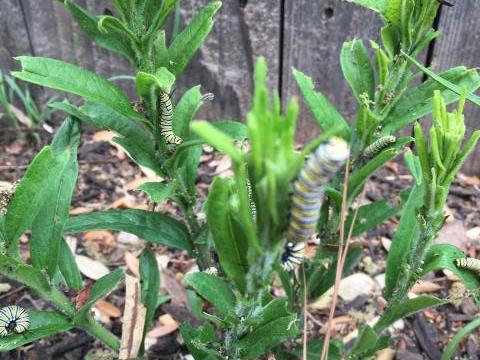If you have read our Blog on Common Monarch Ailments, you will find that there are many diseases, parasites and infections that can infect Monarch caterpillars. It is a common problem for many Monarch rearers but there are ways to prevent this from happening and also prevent it from spreading. Here is how to prevent disease from spreading once you suspect your Monarch may be infected. What You Can Do1. Isolate Your Caterpillar
If there is a chance of infection, move your caterpillar or chrysalis to an area by itself where it cannot infect other caterpillars. Use a milkweed leaf, gloves or brush to avoid touching the caterpillar directly. If you think you may have touched it, wash your hands afterwards. TIP: If the caterpillar has reached chrysalis stage and something seems off, you can use a piece of floss or thread to remove the silk pad from the cage and move it to another area. 2. Clean Cage Once you remove the potentially infected caterpillar, promptly disinfect the entire cage to prevent contamination to other caterpillars. To do this, remove the other cats and place them in a clean holding container until you are finished cleaning the cage. Also, replace old milkweed leaves with fresh leaves. To disinfect cage you can use a weak bleach solution (about 1 to 10 parts bleach to water) or a natural disinfect such as Meyer's Multi-surface Cleaner. Use a spray bottle or dunk cage in a large tub and let it sit for about 30 minutes. Rinse thoroughly with water afterwards and allow to DRY before adding any caterpillars back in. 3. Keep A Close Eye on Your Sick Caterpillar Check on the caterpillar every 4-6 hours to see if the case worsens. Keep the potentially dangerous Monarch separated until it reaches full metamorphosis to avoid spreading the ailment.
7 Comments
6/24/2021 05:00:37 am
I have monarch caterpillar in my backyard and knowing this will help me a lot to decide what should I do. Thank you so much for sharing this. I appreciate it a lot.
Reply
6/24/2021 11:56:57 pm
I agree! Predators such as spiders and fire ants kill and eat monarch eggs and caterpillars. Some birds and wasps feed on adult butterflies.
Reply
Have 17 eggs All hatched 2 died when starting chrysalis turned black and liquified Foubd one 4 day old cat seemed fine! Went to chrysalis never finished hanging black now! Showed no signs of infection How can i keep them safe? Clean cages fresh leaves daily no moisture not in direct sun Why are they dying????
Reply
Jocelyn
8/28/2022 09:10:00 am
Sounds like a viral infection, most common is NPV, but there are others as well. Most effective way to prevent viral and bacterial infections is to rinse leaves before feeding (even if from your own yard), and rearing them in their own containers, so if any do become contaminated, they can not spread to the others in your colony.
Reply
Ann
2/2/2023 05:49:50 pm
They have been infected by the tachnid fly. They lay their eggs on the caterpillar. The eggs hatch inside the caterpillar and eat the poor cat inside out. They turn black and start liquefying. It's very very sad.😔
Reply
8/29/2023 10:43:16 pm
Your detailed and practical advice for identifying signs of infection, isolating infected caterpillars, and taking the necessary precautions to prevent the spread of disease is immensely helpful for anyone engaged in Monarch rearing. Your dedication to sharing such important information and providing clear steps to take during such situations is truly commendable. Thank you for your commitment to the well-being of these delicate creatures and for guiding readers in how to navigate these challenges effectively.
Reply
Leave a Reply. |
AuthorRebecca Chandler Archives
March 2024
Categories |



 RSS Feed
RSS Feed